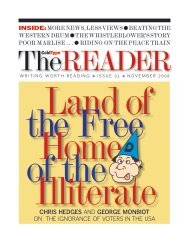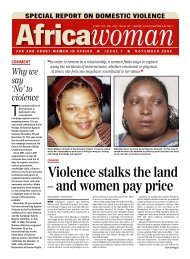UPDATED - ColdType
UPDATED - ColdType
UPDATED - ColdType
- TAGS
- updated
- coldtype
- coldtype.net
Create successful ePaper yourself
Turn your PDF publications into a flip-book with our unique Google optimized e-Paper software.
there may also be substantial harm to irreplaceable<br />
cultural heritage in the form of damage to<br />
ancient structures, archaeological sites, and artifacts.<br />
“The first immediate danger to Iraq’s cultural<br />
sites is bombing or combat damage. In the first<br />
Gulf War, damage of this kind appears to have<br />
been fairly limited. “There are millions of sites in<br />
Iraq,” said Selma Radhi, an independent scholar<br />
and consultant archaeologist who has excavated<br />
and restored ancient monuments all over the<br />
Middle East. “How could one choose two that<br />
should not be bombed?”<br />
The greater worry<br />
WHILE such damage is a concern, it’s likely not<br />
the greatest worry. “We’re not so worried about<br />
errant bombing,” explained McGuire Gibson, an<br />
Iraq specialist at the University of Chicago’s Oriental<br />
Institute. “It could happen, but it’s that<br />
period of uncertainty that would come with the<br />
war that would be a problem.”<br />
“Gibson and many other prominent archaeologists<br />
are most concerned about looting. It’s been<br />
an ongoing problem in Iraq since the first Gulf<br />
War, when Iraq’s formerly robust Department of<br />
Antiquities began to decline. In the event of combat<br />
and/or unrest, looting could become much<br />
worse.”<br />
Debating BBC coverage<br />
EMBEDDED: WEAPONS OF MASS DECEPTION<br />
YESTERDAY, I also carried excerpts from a<br />
Guardian article lambasting the BBC for its war<br />
coverage. I queried BBC News chief Richard<br />
Sambrook for his response. He wrote back – one<br />
of the few news executives willing to respond to<br />
216<br />
critics – saying, “There is a real critique to be<br />
done of our coverage of course, but that wasn’t<br />
it.” He then included a response which later<br />
appears in part in today’s Media Guardian:<br />
“David Miller’s attack on the BBC’s journalism<br />
(Taking Sides 22.4.03) is a lazy cobbling together<br />
of disparate evidence taken out of context in an<br />
attempt to reach a pre-ordained conclusion. He<br />
is also factually wrong in a number of instances.<br />
“The BBC has not argued that because we are<br />
criticized by all sides we must be right – we have<br />
suggested it shows the case from either side is<br />
not straightforward.<br />
“Mr. Miller suggests we virtually ignored<br />
opposition to the war. Yet in many programs,<br />
across radio and TV, opponents to war were regularly<br />
given the opportunity to express their<br />
views, anti-war demonstrations were reported<br />
and opinion polls showing the balance of public<br />
opinion fully analyzed. (DISSECTOR: On this<br />
point, and for what it is worth, I would interject<br />
that I was interviewed several times on BBC<br />
Radio, and only once on CNN. A BBC world service<br />
reporter came along to a demonstration in<br />
New York that I was covering.)<br />
“Mr. Miller selectively quotes research carried<br />
out for the Frankfurter Allgemeine Zeitung. He<br />
doesn’t, strangely, mention that the same survey<br />
showed the BBC, uniquely out of the broadcasters<br />
analyzed, was even-handed in its reporting of<br />
the U.S. military action and in reporting of coalition<br />
and civilian casualties. Presumably it didn’t<br />
fit his argument.”<br />
I have not watched as much BBC coverage as I<br />
would have liked. Many of our readers preferred<br />
it to the U.S. cable nets. But there are many in<br />
England, especially around the website MediaLens<br />
which have compiled more detailed cri-

















